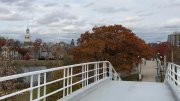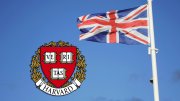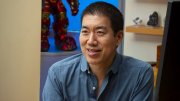
Photograph by Stephanie Mitchell / Harvard News Office
Venkatesh “Venky” Narayanamurti
The 10-year tenure of Venkatesh Narayanamurti, dean of the School of Engineering and Applied Sciences (SEAS), will end in September—most likely with the appointment of an interim successor—but Venky, as he is known, plans to remain actively involved in shaping a new curriculum and new pedagogical approaches in science. (For an update, see "SEAS Interim Dean Appointed."
More broadly, he hopes to participate in a redefinition of “liberal-arts education” in which engineering would appear. SEAS already plays an important part in linking schools and disciplines to each other and to undergraduate education, a role exemplified in the University’s plans to establish a major presence in the field of bioengineering. As Harvard recruits a dean to succeed him, Venky hopes the University will demonstrate its commitment to the field by constructing a signature building in Allston dedicated to the engineering sciences. In the past, Harvard has allowed exemplary efforts in engineering to founder (Venky cites, for example, development of the Mark 1 computer, and expertise in water resources). Today, in a world in which science and technology have come to play an increasingly central role in the dissemination and application of knowledge, Harvard’s leadership in higher education is more closely linked than ever, Venky believes, to the fate of SEAS.
One of the primary challenges facing the school—Venky calls it “a strength and a weakness”—is the breadth of activities in which SEAS is involved, ranging from applied mathematics and applied physics to computer science and electrical, biological, chemical, and other engineering disciplines. Schools and centers from throughout Harvard are eager to work closely with SEAS; already, the school is linked in many ways to the Faculty of Arts and Scences (of which it is technically part) and administers a doctoral program with the Business School in science, technology, and management. In view are joint appointments with the School of Public Health, collaborations with the Law School on issues of privacy and security raised by new technologies, and with the Medical School in bioengineering. In part to facilitate such collaborations, to enhance its role as a “linking” school, and to strengthen the University as a whole, SEAS plans to grow by adding 10 positions in bioengineering and others in energy technologies, nanotechnologies, sustainability, and information science.
Closest to fruition is the joint program in bioengineering, which a University report, released in July, called “the natural next step in the intellectual development of biology, medicine, and engineering…” (see “On the University’s Agenda,” July-August 2008, page 61). Bioengineering plans include the creation of undergraduate and graduate curricula and the establishment of a “flagship” research institute in biologically inspired engineering to be housed in the first Allston science building. (Bioengineering is now offered to undergraduates as a subfield within engineering science. The explosion of student interest is reminiscent, Venky says, of that for computer science a generation ago.)
Citing two of the greatest challenges of the twenty-first century—promoting human and planetary health—the July report emphasized that “the future presents unprecedented opportunities in bioengineering, which could lead to enormous advances of potential societal and economic value,” and recommended that Harvard begin an international search this September for the director for a Harvard University Bioengineering (HUB) program. By next September, Harvard will have established a Ph.D. program and begun recruiting faculty members for fall 2010, coincident with the launch of an undergraduate curriculum and the enrollment of the first class of doctoral candidates. (Although this schedule likely turns on the hiring of a new SEAS dean, possibly delaying its implementation, Venky considers it appropriate that a final resolution await his successor: “Who knows? That person might be a bioengineer.”)
Meanwhile, he will focus on curricular reform. “I believe that the liberal-arts education of the twenty-first century has to be different,” he says, noting that information is no longer centered in Widener Library. “The library made Harvard—we have always had the rarest things, the best repository of knowledge, [but] information now is digital; it is on the Web. Widener Library is very valuable, but it is almost a museum.” Social scientists, even humanists, have to understand and appreciate technology. Areas like economics and government are much more quantitative and data intensive, he points out. Engineers and computer scientists, on the other hand, must be aware of the societal consequences of what they do and the societal problems to be solved.
Even the definition of a broadly educated person must evolve with the changing times, Venky says: “You no longer have a liberal-arts education unless you have some feeling for technology.” After a sabbatical, he expects to help develop an undergraduate curriculum that reflects this view. Within the sciences, it is sure to include more experiential, hands-on learning. There may also be changes in the sequence of courses within engineering disciplines, which traditionally start with tough “rite of passage” classes. Venky believes that introducing the joys of engineering early on will help attract and retain a broader range of students—all the more important because attrition among engineering students is a nationwide problem even as engineering skills have become more necessary than ever.
Harvard, Venky says, needs to attract a dean with vision by constructing a signature campus with SEAS as one of the pillars—a statement that says Harvard is serious about science and engineering.








